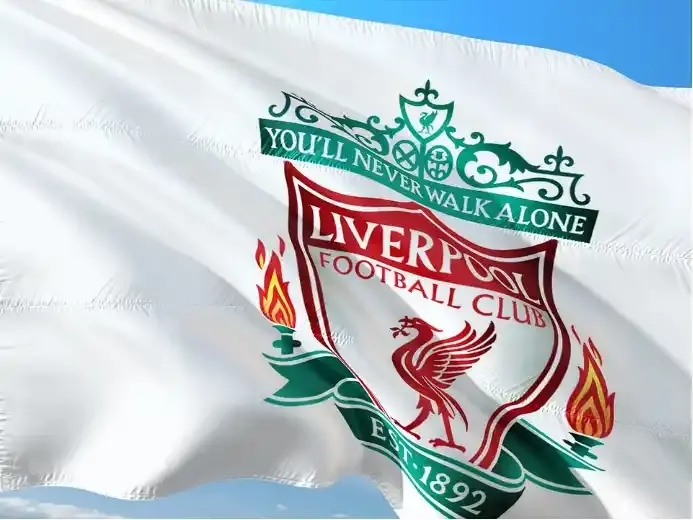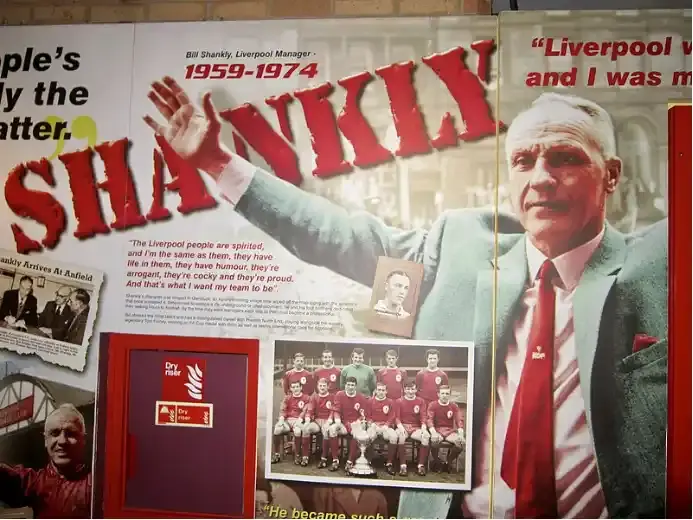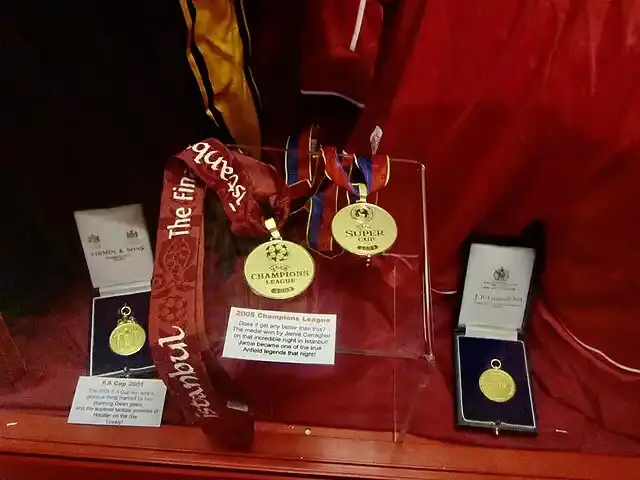The Rise of the Reds from the Ashes: The Epic Story of Liverpool Football Club's Triumphs and Setbacks
You can't make yourself love someone. But you can make yourself love a team. It's not the glorious trophies and victories that make you love the team, it's the failures. The heartbreak drowned by the spring rains, and the mad rush for glory that usually ends in defeat. But not always. A football club rarely has the history and fame of the English club Liverpool (Reds). This article tells the story of Liverpool FC and the difficulties they went through, and their return every time to rise from the ashes, and emerge stronger than before.
Show key points
- Liverpool FC’s identity is deeply rooted in its triumphs through hardship, with fans often finding a stronger bond through the team’s failures than its victories.
- The club was founded in 1892 by John Houlding after a dispute with Everton, establishing Anfield as its home and marking the beginning of an extraordinary football journey.
- Early decades saw Liverpool rising swiftly, claiming their first league title in 1901 and laying the foundation for a resilient and proud football culture.
- ADVERTISEMENT
- World wars and economic struggles posed serious challenges for the club, yet Liverpool’s passionate fan base and commitment to the game remained unwavering.
- The arrival of Bill Shankly in 1959 sparked a transformative era that shaped the club’s modern identity and ushered in multiple domestic and international successes.
- Liverpool’s golden era from 1974 to 1990 brought unparalleled glory under Paisley and Fagan, yet was also marred by the tragedies of Heysel and Hillsborough.
- In recent years, under Jürgen Klopp’s leadership, Liverpool has reemerged as a global powerhouse, capturing the Champions League in 2019 and ending a 30-year league title drought in 202
Early years (1892 - 1914):

The club was founded in the late nineteenth century, in the bustling city of Liverpool, following a dispute between Everton and John Holding, the owner of Anfield. In 1892, John Holding made the bold decision to establish his own football team, and it was this decision that would shape the fate of the club and the city, and pave the way for a remarkable football journey. Anfield Stadium became the club's new headquarters. He went on to witness countless moments of triumphs and heartbreak over many years, in which Liverpool FC was a symbol of resilience. Liverpool wasted no time in announcing their attendance; in their opening season, the club won the Lancashire Premier League. By 1901, Liverpool had already etched its name in the annals of football history by securing its first league title. This achievement was a testament to the club's rapid rise and ability to compete with established teams. These early years were all about building a legacy, establishing the club's culture, and laying the foundation for future glories.
Recommend
The outbreak of World War I led to the suspension of football competitions. Anfield, once a place of loud cheers, fell silent as the world grappled with the horrors of war. But the story of Liverpool FC is not over. The following chapters will see him face challenges and victories that will cement his position as a football giant.
Early years (1892 - 1914):
The club was founded in the late nineteenth century, in the bustling city of Liverpool, following a dispute between Everton and John Holding, the owner of Anfield. In 1892, John Holding made the bold decision to establish his own football team, and it was this decision that would shape the fate of the club and the city, and pave the way for a remarkable football journey. Anfield Stadium became the club's new headquarters. He went on to witness countless moments of triumphs and heartbreak over many years, in which Liverpool FC was a symbol of resilience. Liverpool wasted no time in announcing their attendance; in their opening season, the club won the Lancashire Premier League. By 1901, Liverpool had already etched its name in the annals of football history by securing its first league title. This achievement was a testament to the club's rapid rise and ability to compete with established teams. These early years were all about building a legacy, establishing the club's culture, and laying the foundation for future glories.
The outbreak of World War I led to the suspension of football competitions. Anfield, once a place of loud cheers, fell silent as the world grappled with the horrors of war. But the story of Liverpool FC is not over. The following chapters will see him face challenges and victories that will cement his position as a football giant.
Victories and setbacks in the interwar period (1918-1945):
The twenties were a period of unbridled success for Liverpool, and he added two more league titles to their trophy cabinet. But the interwar period heralded a new set of challenges, and the Liverpool FC journey was a mirror of the vicissitudes of the times. The effects of the First World War caused societal unrest, and unrest increased in the thirties. Economic challenges and the looming uncertainties of another global conflict cast a shadow over the club, and the team faced adversity. But these turbulent years were also a testament to the enduring passion of his supporters, and the inexhaustible commitment to the beautiful game.
Post-war renaissance (1945-1974):

Bill Shankly, the charismatic Scottish manager, arrived at Liverpool in 1959, and his appointment was a turning point in Liverpool's history. The club needed a renaissance, and Shankly was the man who breathed new life into it and extended its influence far beyond the football field. His philosophy was to instill pride, passion, identity and unshakable fighting spirit in Liverpool's DNA, which resonated deeply with Liverpool fans. Shankly is the one who presented the distinctive set in all red to create an image of the club's unity and design.
Under Shankly's guidance, Liverpool's style of play has evolved, and the team has embarked on a remarkable journey of success. Trophies began to pile up, including three league titles in 1964, 1966 and 1973 and, most notably, the first FA Cup in 1965. Anfield's famous cup grandstand has become synonymous with Liverpool's success, and a fortress echoing with the song "You'll Never Walk Alone", which united fans and players in one community, creating an atmosphere that inspired players and created fear in the hearts of visiting teams.
The Golden Age (1974-1990):
Bob Paisley and Joe Fagan took the mantle of leadership at Liverpool FC, continuing Shankly's legacy and leading the club into an unprecedented era of success spanning nearly two decades, despite the neglect of the city by the authorities and plans to descend into insignificance and poverty. This golden age saw Liverpool dominate English football and conquer Europe, with a plethora of titles including numerous leagues, European Winners' Cups and domestic trophies. However, this golden age was not without deep tragedies that left an indelible mark on the club and its supporters. The Hazel Stadium disaster occurred during the European Cup final between Liverpool and Juventus in 1985, resulting in the loss of 39 people and banning English clubs from European competitions for five years. The Hillsborough disaster erupted during the FA Cup semi-final between Liverpool and Nottingham Forest in 1989, killing 96 fans. These two tragic events have had a profound impact on Liverpool Football Club, and the wider football community.
Modern era (1990 to present):

The period of the nineties and the early first decade of the twenty-first century was marked by successes and setbacks. While there have been victories, including multiple victories in the FA Cup and League Cup, the Premier League title remained elusive. The appointment of German Jürgen Klopp as Liverpool manager in 2015 was the announcement of an exciting new chapter in the club's history. Klopp's charismatic leadership, combined with his strategic acumen, injected new energy into the squad and brought Liverpool back to the forefront of English and European football. Under Klopp's leadership, Liverpool secured a historic victory in the 2018-2019 Champions League, adding another European crown to their history. In the 2019-2020 season, he clinched the English Premier League title, which has been awaited for thirty years. Suffice it to mention that between 2017 and 2021, Liverpool did not lose a game at home, the second longest run of any team in the Premier League.
From the bustling docks of the Mercy River to the pinnacle of world football, Liverpool Football Club's journey is more than just a sporting story; it is a story of passion, resilience and unity. The club is firmly rooted in the working-class spirit of Liverpool. It reflects the city's spirit of hard work, determination and attitude that never dies. The club's legacy will continue to unite people from diverse backgrounds, and its story will continue to inspire the next generation of players, managers and fans. Whatever the shifts, one thing will remain constant: Liverpool FC will never go it alone.
![]()
Secrets of academic excellence: how to achieve the highest grades with effective methods
Secrets of academic excellence: how to achieve the highest grades with effective methods more- ADVERTISEMENT
![]()
Many amazing things your nails can tell you
The Many Surprising Things Your Fingernails Can Tell You more- ADVERTISEMENT
![]()
Cayan Tower in Dubai, the world's tallest twisted tower
Cayan Tower in Dubai Marina is the world’s tallest twisted tower with 73 crookedly designed floors. Its striking spiral shape not only impresses visually but also protects against harsh winds. With sea views, luxury interiors, and smart climate features, it truly stands out as an architectural icon. more- ADVERTISEMENT
![]()
How a failed experiment led to Einstein's first big revolution
The Michaelson-Morley experiment tried to detect the mysterious ether believed to carry light—but found nothing. This surprising result helped spark Einstein’s radical idea: light doesn’t need a medium, and its speed is always constant. That bold insight laid the foundation for the revolutionary theory of special relativity. more- ADVERTISEMENT
![]()
Polar bears and climate change: the threatened future of Arctic icons
Polar bears, majestic symbols of the Arctic, face a deeply troubling future as climate change melts their icy habitat, disrupts their food sources, and puts pregnant females at greater risk. With shrinking ice and rising temperatures, their survival grows harder, making urgent global action vital to protect these stunning creatures. more- ADVERTISEMENT
![]()
Post-pandemic travel: reshaping the future of tourism
The pandemic reshaped travel, pushing people toward local, safer, and more personalized adventures. Technology now guides safer journeys, while hotels and airlines adapt with flexible and health-focused options. As the world reopens, travelers seek meaningful, sustainable experiences—reflecting a new era of conscious and responsible tourism. more- ADVERTISEMENT
![]()
How did you start blogging music?
How did music notation begin more- ADVERTISEMENT
![]()
Reading useless books: Here's a better way to read
Reading books can be slow, outdated, and too passive for today’s fast-paced world. Active learning—like discussing, questioning, and applying knowledge—plus modern tools like podcasts and online courses, make learning faster, deeper, and more fun. more- ADVERTISEMENT
![]()
The historic citadel of Aleppo ... One of the largest and oldest castles in the world
Aleppo Citadel, one of the world’s oldest castles, stands proudly in Syria’s ancient city. Once a temple and fortress, it saw civilizations from Greeks to Ottomans. Its restored Mamluk throne hall, with marble and basalt details, remains a key highlight, offering insight into the citadel’s rich and layered history. more- ADVERTISEMENT
![]()
The art of observation – the ability to pay attention to small things
The art of observation is about noticing the overlooked, celebrating what makes people unique, and connecting through shared wonder. It's a simple yet powerful way to deepen relationships, spark creativity, and stay human in a distracting world. Noticing the little things? That’s where the magic begins. more- ADVERTISEMENT





















